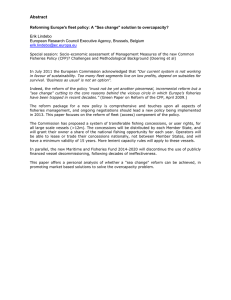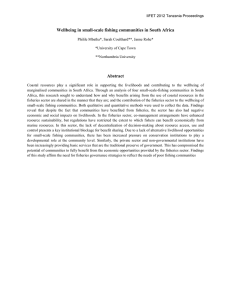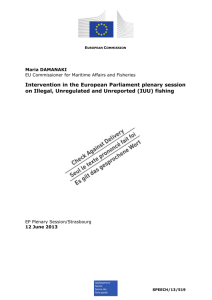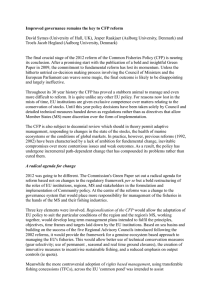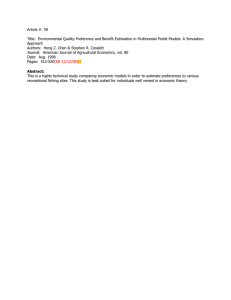The control regime: a new approach!
advertisement
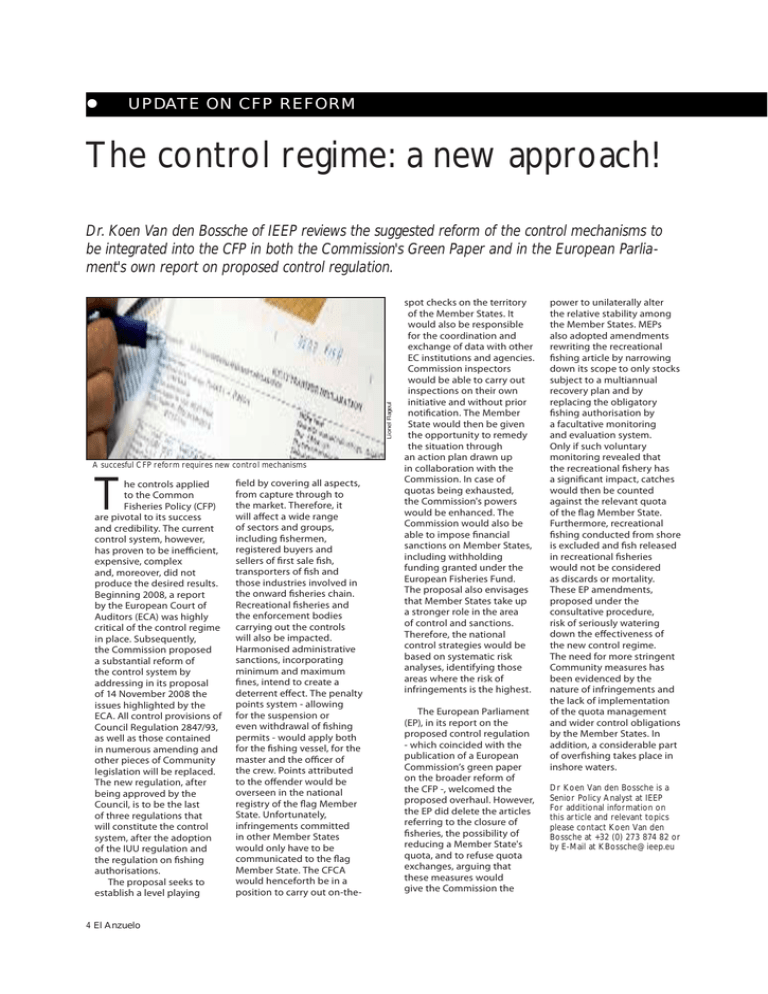
z UPDATE ON CFP REFORM The control regime: a new approach! Lionel Flageul Dr. Koen Van den Bossche of IEEP reviews the suggested reform of the control mechanisms to be integrated into the CFP in both the Commission's Green Paper and in the European Parliament's own report on proposed control regulation. A succesful CFP reform requires new control mechanisms T he controls applied to the Common Fisheries Policy (CFP) are pivotal to its success and credibility. The current control system, however, has proven to be inefficient, expensive, complex and, moreover, did not produce the desired results. Beginning 2008, a report by the European Court of Auditors (ECA) was highly critical of the control regime in place. Subsequently, the Commission proposed a substantial reform of the control system by addressing in its proposal of 14 November 2008 the issues highlighted by the ECA. All control provisions of Council Regulation 2847/93, as well as those contained in numerous amending and other pieces of Community legislation will be replaced. The new regulation, after being approved by the Council, is to be the last of three regulations that will constitute the control system, after the adoption of the IUU regulation and the regulation on fishing authorisations. The proposal seeks to establish a level playing 4 El Anzuelo field by covering all aspects, from capture through to the market. Therefore, it will affect a wide range of sectors and groups, including fishermen, registered buyers and sellers of first sale fish, transporters of fish and those industries involved in the onward fisheries chain. Recreational fisheries and the enforcement bodies carrying out the controls will also be impacted. Harmonised administrative sanctions, incorporating minimum and maximum fines, intend to create a deterrent effect. The penalty points system - allowing for the suspension or even withdrawal of fishing permits - would apply both for the fishing vessel, for the master and the officer of the crew. Points attributed to the offender would be overseen in the national registry of the flag Member State. Unfortunately, infringements committed in other Member States would only have to be communicated to the flag Member State. The CFCA would henceforth be in a position to carry out on-the- spot checks on the territory of the Member States. It would also be responsible for the coordination and exchange of data with other EC institutions and agencies. Commission inspectors would be able to carry out inspections on their own initiative and without prior notification. The Member State would then be given the opportunity to remedy the situation through an action plan drawn up in collaboration with the Commission. In case of quotas being exhausted, the Commission's powers would be enhanced. The Commission would also be able to impose financial sanctions on Member States, including withholding funding granted under the European Fisheries Fund. The proposal also envisages that Member States take up a stronger role in the area of control and sanctions. Therefore, the national control strategies would be based on systematic risk analyses, identifying those areas where the risk of infringements is the highest. The European Parliament (EP), in its report on the proposed control regulation - which coincided with the publication of a European Commission’s green paper on the broader reform of the CFP -, welcomed the proposed overhaul. However, the EP did delete the articles referring to the closure of fisheries, the possibility of reducing a Member State's quota, and to refuse quota exchanges, arguing that these measures would give the Commission the power to unilaterally alter the relative stability among the Member States. MEPs also adopted amendments rewriting the recreational fishing article by narrowing down its scope to only stocks subject to a multiannual recovery plan and by replacing the obligatory fishing authorisation by a facultative monitoring and evaluation system. Only if such voluntary monitoring revealed that the recreational fishery has a significant impact, catches would then be counted against the relevant quota of the flag Member State. Furthermore, recreational fishing conducted from shore is excluded and fish released in recreational fisheries would not be considered as discards or mortality. These EP amendments, proposed under the consultative procedure, risk of seriously watering down the effectiveness of the new control regime. The need for more stringent Community measures has been evidenced by the nature of infringements and the lack of implementation of the quota management and wider control obligations by the Member States. In addition, a considerable part of overfishing takes place in inshore waters. Dr Koen Van den Bossche is a Senior Policy Analyst at IEEP For additional information on this article and relevant topics please contact Koen Van den Bossche at +32 (0) 273 874 82 or by E-Mail at KBossche@ieep.eu
